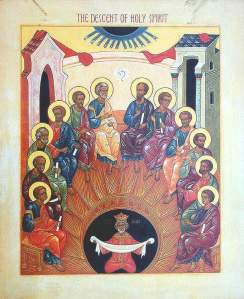 The readings for The Feast of Pentecost:
The readings for The Feast of Pentecost:
Several years ago I met with my spiritual director and told her that I felt as if pieces of my life had been lost along the way. There were pieces of my life I could no longer find or put back together. Some had been lost to fear. Others were lost to the wounds and pain of relationships. Some had been lost to my sins and the ways in which I had hurt others. There were pieces that had been lost to disappointment, regret, and dreams that would not come true. I was standing in the valley of dry bones wondering how, if ever, my life would be put back together. What would become of me?
At some point, it seems, we all stand in the valley of dry bones. We end up there through various circumstances – the loss of a relationship, divorce, the death of a loved one, the loss of our health, the loss of a job and financial security. Some times we wake up one day and wonder who we are and where we are going, exiles in our own home. Regardless of what takes into that valley we stand there, surrounded by bones, looking at the structures that once seemed to support life and want to know, “Can these bones live?”
The pieces of our life may be lost to us but they are never lost to God. God’s answer to our question is always “yes.” “Yes. Not only can these bones live, they will live.” God says, “Prophesy to the bones – speak my language to the bones – and I will cause breath to enter you, you shall live and know that I am the Lord.” God breathes and we live.
God’s language is always one of creation and life. Creation and life are God’s native language. That is the language God speaks to Ezekiel as he watches the dry bones come to life. God’s native language has never ceased to be spoken.
- It was spoken in the beginning when the spirit hovered over the waters and God spoke creation and life into existence.
- It was spoken the day the spirit overshadowed the Blessed Virgin Mary and the angel Gabriel announced the incarnation.
- It was spoken again on the day Christ was baptized in the waters of the Jordan and the spirit, like a dove descended, and the voice declared, “You are my son, the beloved; with you I am well pleased.”
- It was spoken the day the women found the tomb empty and were told, “He has been raised. He is not here.”
- That same native language was spoken on the day of Pentecost as they were all gathered in one place and the winds of change began to blow throw them and fill them.
Every time we hear and trust God’s native language Pentecost is present. Every time the dry bones of our life and world encounter God’s outpouring of Spirit it is Pentecost once again. Pentecost is not simply a one time event in history and God’s native language is not limited to Biblical stories.
We should think of Pentecost as a verb rather than a noun. Pentecost is God’s way of being and acting. God is always “pentecosting” us, speaking the language of life and creation.
The difficulty with Pentecost is that too often we look for the extraordinary, a show stopper, that once in a lifetime experience. But maybe the miracle of Pentecost is not the rushing wind, the divided tongues of fire, or magical fluency in a foreign language.
Maybe the real miracle of Pentecost is that God breathes and fills hearts, souls, minds, and bodies with his own spirit and life. God breathes and his extraordinary power fills and works in common ordinary people in common ordinary ways, transforming life. God breathes and we live.
Every breath of God speaks native language. If life and creation are God’s native language then they are to be our native language also. And it is a language we already know and experience. It lives deep with in us.
We too have spoken or heard it. Think of a time that was deeply meaningful – not necessarily an easy, fun, or sought out time – but one that profoundly transformed your life, your identity, or your relationships. Chances are it was a time of deep love, a moment of reconciliation and forgiveness, the discovery of beauty and creativity hidden deep within you that you did not know was there, a moment of real trust and vulnerability, a day when you experienced hope and a strange sense of peace even as your world swirled in chaos, a quiet moment of intimacy in which everything that needed to be said was said by silence, an experience of unity, an encounter with wisdom, an act of compassion, or profound and sincere gratitude in the face of grace.
Those are moments of life and creation, moments in which God’s native language was spoken and heard, moments in which you were “pentecosted” or perhaps you “pentecosted” another. Regardless, God breathed, those bones lived, and it was Pentecost again.
We may ask if those bones can live but that is not the real question. The question is this: What is our language? What language do we most trust and listen to? What language will we speak to the next person we encounter?

Leave a comment